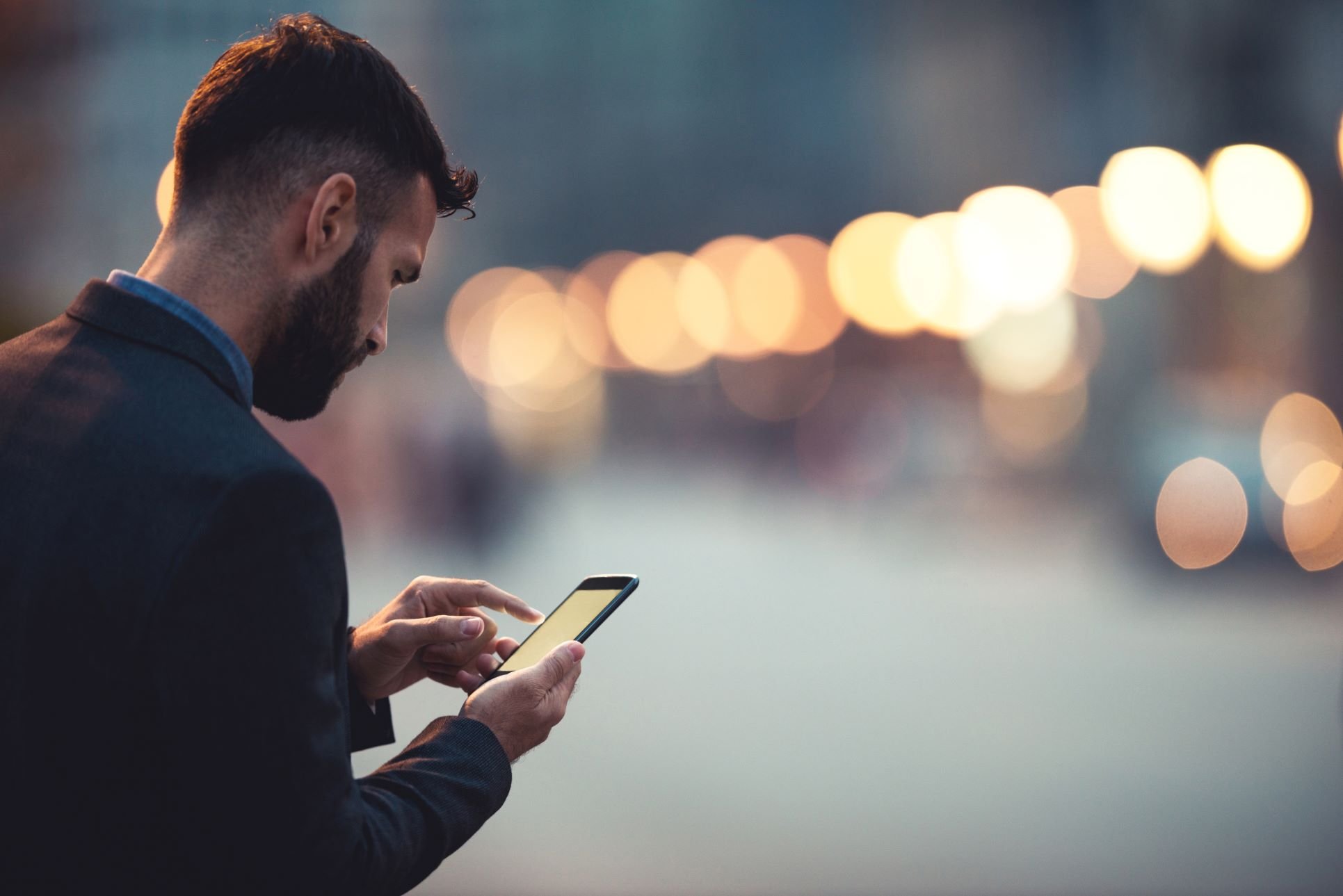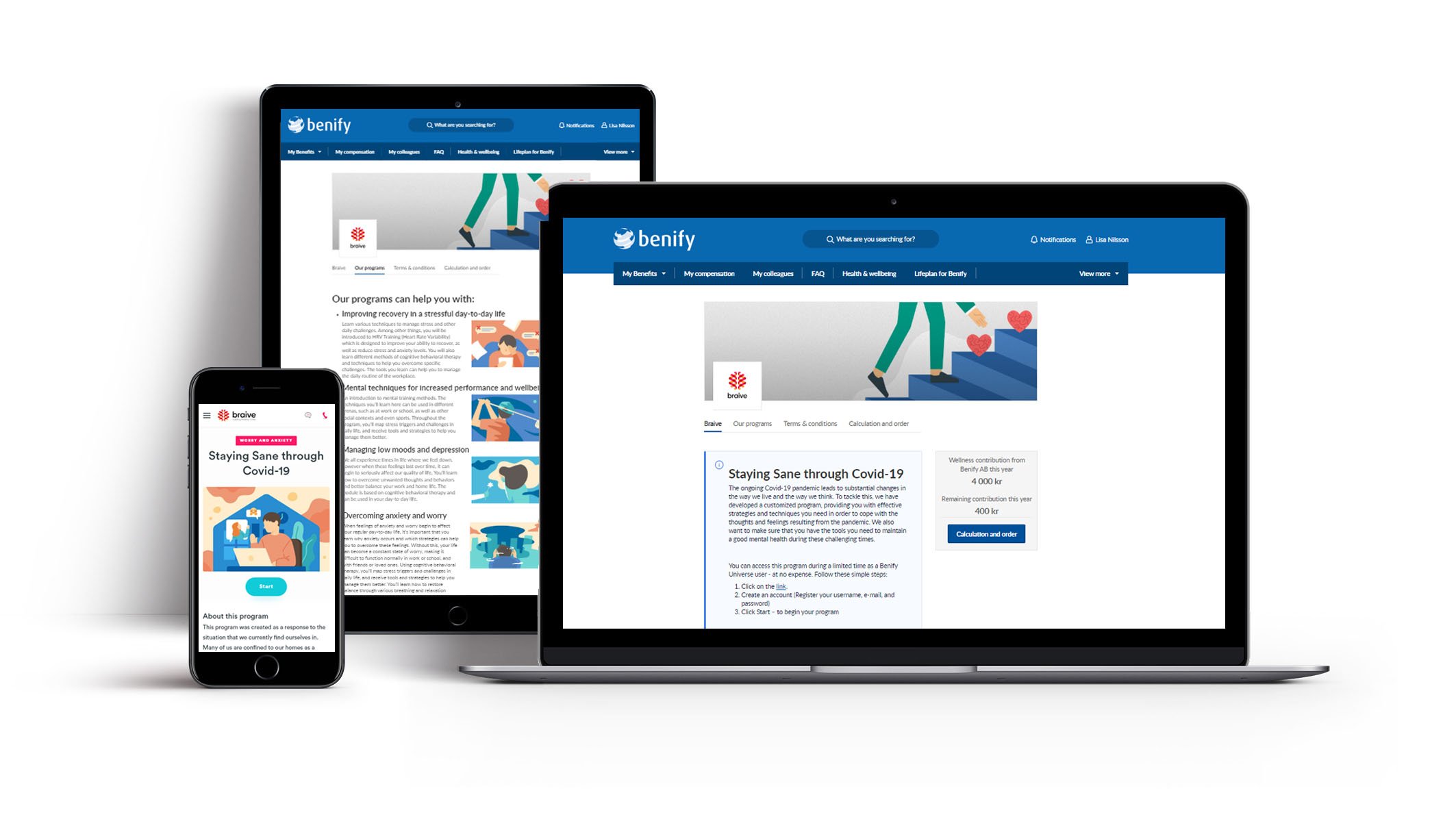As a result of the COVID-19 outbreak, many of us are experiencing increased concern for our health, the health of our loved ones, as well as how the economy and society are being affected. At the same time, social distancing and other measures have seen people isolated from their everyday routines and social situations.
Braive is a digital health platform that offers e-learning programs designed to help individuals tackle specific mental challenges. In this post, Braive founder and chief psychologist, Henrik Haaland Jahren talks to us about the unique challenges the pandemic poses to our mental health, and how we can use digital CBT (cognitive behavioral therapy) to tackle them.
Braive has developed a new, customized CBT program to help people maintain good mental health during the ongoing coronavirus situation. The program is offered completely free of charge through Benify's benefits and engagement platform. Therefore, over two million users worldwide have access to free CBT treatment to combat COVID-19 related concerns.
Henrik, tell us briefly about the new CBT program and how it came about.
 The program is called Staying Sane through Covid-19, and it came about as a result of the current situation caused by the pandemic, which risks having a long-term effect on people’s mental health. We wanted to develop a program that gives people practical tools for maintaining strong mental health, partly by maintaining helpful routines during these times, and partly by being better equipped to handle any concerns that the situation brings.
The program is called Staying Sane through Covid-19, and it came about as a result of the current situation caused by the pandemic, which risks having a long-term effect on people’s mental health. We wanted to develop a program that gives people practical tools for maintaining strong mental health, partly by maintaining helpful routines during these times, and partly by being better equipped to handle any concerns that the situation brings.
How can CBT treatment help people manage their concerns?
The program focuses a lot on teaching individuals techniques to direct their attention through various mindfulness and meditation exercises, for example. It’s about becoming aware of where you are in your mind and being able to break unhelpful thought processes. These are skills that can be trained, but mental health is also something that can deteriorate. You can learn a lot, but if you end up in a situation that involves increased stress and anxiety, you tend to fall back into unhelpful behaviors. Therefore, it’s important for people to have methods to continue working with throughout their life in order to develop and maintain good mental health.
What challenges does this kind of pandemic pose to our mental health, compared to other types of crises?
All our crisis response systems are designed to deal with crises that are here and now, which then go away. When a crisis has passed, we then have time to recover. The challenge now is that we are forced to live with a high degree of uncertainty for a very long time, which means there’s a risk that stress will accumulate over time.
Additionally, at the same time, many people are now more isolated than usual and disconnected from their daily routines and social situations. Therefore, our usual methods for recovery are missing. Humans are social beings. Recovery is not only passive, like resting and meditating but is also active, such as spending time with family and friends. For many people, work and colleagues provide an important social aspect. So, when we lose our normal methods of recovery, it’s important to find tools to replace them.
How can people manage these challenges?
The most important thing is paying attention to whether you get stuck in worry and concern and finding techniques to regulate your stress levels. It’s also good to set routines for a different everyday, so it becomes as close to your normal everyday as possible and you learn to focus on what you need to do, despite that the crisis exists. You also need to find ways to recover. It may be about setting aside time to focus on breathing for a few minutes or directing your attention very deliberately, rather than letting your mind wander towards worry and concern. The more you practice it, the better you get at it.

Are there certain risk groups whose mental health can be affected more than others by the current situation?
If someone already has the tendency to catastrophize or is prone to anxiety, I think it’s easier to get stuck reading all the news, which can aggravate their anxiety.
If you’re a very social person, isolation can result in increased stress. Many of us may also experience a relative getting sick, or worse, dying, during this. And dealing with grief can be a lot more difficult when ordinary routines are missing.
How can an employer detect and support warning signals from their employees?
It’s important to remember that we’re all in this together. Employers need to communicate this and give employees access to tools and support. It’s also important that colleagues show they’re there for each other. For example, if you notice someone seems to be more isolated or isn’t behaving in a way that they normally do, then it could be a sign. In video meetings, it may be easier to find out if a person seems tired, loses concentration, or is busy talking about the virus outbreak.
What long-term effects can the pandemic have on mental health?
As I said, I think this is accumulative. Many people have been affected by the crisis, but we’ve not yet reached the point where people seek help. Rather, there’s a reduced number of people seeking treatment at health centers and other clinics now. I think the effect will start to appear in May when the more acute turmoil begins to emerge. Now everyone is concentrating on what is important right now, such as keeping a distance and washing their hands.
During a crisis, often people just try to keep their head above water. But when the crisis is over, and we can finally take a break, thoughts that have been pushed down can come to the surface. CBT can be a way to prevent problems that might otherwise surface later. For example, after an exhausting period, there’s an increased risk of depression. People can be worn-out, tired, and may not have slept well for a long time. And when we finally have the time to slow down and feel, the effects can set in. For example, people who have panic attacks often get attacks in the shower, or in other places where they relax. So, I absolutely believe there may be delayed effects of the pandemic that we need to prevent now.
Are there lessons we can take away with us when the pandemic is over...
... for work?
It’s very easy to focus on the negative, and there are many tough challenges, but we mustn’t forget to see what we can learn as individuals and as organizations. People are different. For example, some may find they work more efficiently from home and may ask to do so twice a week in the future. As a result, more employers may decide to offer their employees that type of flexibility.
... for society at large?
This is a very unusual situation that I think will change how we relate to each other, change our consumption, our travel habits…but we need to remember we’re in this together and we need to support each other. There’s a greater shared humanity, an increased understanding, and increased care between people. And helping others, such as shopping for an elderly neighbor or supporting a local business, can also be a way to make sense of the situation. Doing things for others is, of course, good for the recipient, but also good for our own well-being.
Is there more interest from employers to offer their employees digital CBT or similar services than before?
Yes, I feel there’s an increased knowledge among employers today about the effects it can have if employees have mental health challenges. Many employees manage to work despite challenges but are far from the best version of themselves.
At the same time, there’s still a stigma - we hesitate to tell HR or management that we need help. In our society, the willingness to ask for help is generally small when it comes to our mental health. As a psychologist, I’ve met people who’ve had social anxiety for twenty years without doing anything about it, which, of course, has greatly impaired their life quality.
The advantage of digital CBT is that employees are given the opportunity to seek out the help they need, completely anonymously, and can work on it at their own pace. If there are more difficult issues, digital CBT can be a great first step that can then be followed by meeting with a psychologist. But it can also be about working on specific things that can benefit you at work, for example, becoming more secure in your ability to give presentations or speak up during meetings. You train yourself mentally. And work is a great platform for testing what you’ve learned.
I also believe that employees generally place higher demands on employers today when it comes to offering a wide range of benefits where everyone can choose what suits them best. It also gives employees greater autonomy.

About Braive
Founded in Norway in 2015, Braive offers e-learning programs to help people tackle specific mental challenges.